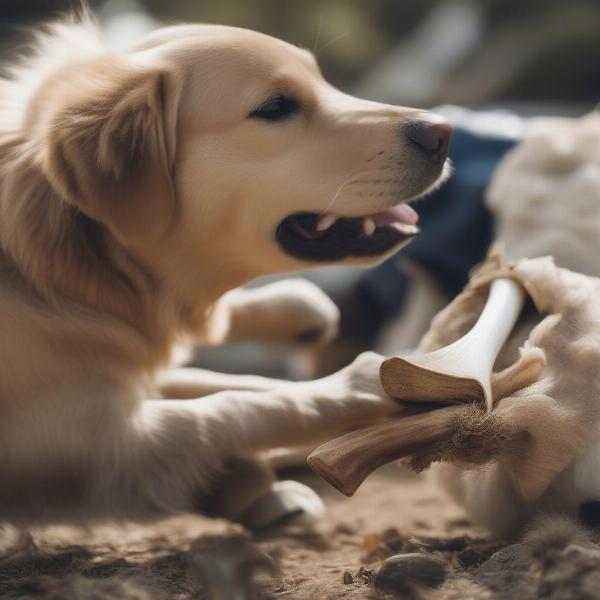Yak bones are becoming increasingly popular as a long-lasting chew for dogs. But are they right for your furry friend? This guide will explore everything you need to know about yak bones for dogs, from their benefits and potential risks to choosing the right size and supervising your dog’s chewing habits. We’ll also cover how to soften yak bones and answer your frequently asked questions.
What are Yak Bones, and Why Are They Good for Dogs?
Yak bones, sometimes called Himalayan dog chews, are a type of hard cheese chew made from yak and cow milk, and sometimes lime juice and salt. They’re a great alternative to traditional rawhide chews, offering a longer-lasting, digestible, and generally safer chewing experience. Chewing on yak bones can help satisfy a dog’s natural instinct to chew, reducing boredom and destructive behaviors. Additionally, the chewing action helps scrape away plaque and tartar, promoting dental health. These durable chews are also a good source of protein and calcium.
Choosing the Right Yak Bone for Your Dog
Selecting the appropriate size yak bone is crucial for your dog’s safety. Always choose a size that’s larger than your dog’s mouth to prevent choking hazards. For puppies and small breeds, smaller yak bones or yak chew sticks are recommended. Larger breeds can handle the standard or even extra-large yak bones. When in doubt, opt for the larger size.
Potential Risks of Yak Bones for Dogs
While yak bones offer many benefits, it’s essential to be aware of potential risks. Hard yak bones can pose a choking hazard, particularly for aggressive chewers. Always supervise your dog while they’re enjoying a yak bone. Another potential issue is broken teeth. While rare, dogs with weak teeth or those who chew excessively may be at risk. Finally, some dogs may experience digestive upset if they ingest large pieces of the yak bone.
 Dog Chewing Yak Bone Supervised
Dog Chewing Yak Bone Supervised
How to Soften a Yak Bone
As the yak bone gets smaller and harder, you can soften it to make it chewable again. Simply soak the chewed end in warm water for a few minutes, or microwave it for a short burst (15-20 seconds). This will puff the yak bone, creating a softer, chewy texture that’s easier and safer for your dog to enjoy.
Himalayan Yak Chews vs. Rawhide: A Comparison
Yak chews are a healthier and safer alternative to rawhide. Rawhide can be difficult for dogs to digest and can pose a choking hazard. Yak chews, on the other hand, are more digestible and break down more easily in the dog’s stomach.
Are Yak Bones Good for Puppies?
Yak chews are generally safe for puppies, but it’s essential to choose the appropriate size and supervise them closely. Opt for smaller yak chews designed specifically for puppies to minimize choking hazards.
Conclusion
Yak bones offer a durable, digestible, and generally safe chew option for dogs. By choosing the right size, supervising your dog, and understanding the potential risks, you can provide your furry friend with a satisfying and beneficial chew experience. Remember to soften the yak bone as it gets smaller and harder to further extend its lifespan and ensure your dog’s continued enjoyment.
FAQ
- Are yak bones digestible? Yes, yak bones are more digestible than rawhide and break down more easily in a dog’s stomach.
- Can puppies have yak chews? Yes, puppies can have yak chews, but choose smaller sizes designed for puppies and supervise them closely.
- How long do yak chews last? Yak chews are long-lasting, offering hours of chewing enjoyment for your dog. The lifespan depends on the size of the chew and your dog’s chewing habits.
- What are yak chews made of? Yak chews are primarily made from yak and cow milk, and sometimes lime juice and salt.
- How do I clean a yak chew? You can simply wash the yak chew with warm water and soap.
- What should I do if my dog breaks a tooth on a yak chew? Contact your veterinarian immediately if your dog experiences any dental issues related to chewing a yak bone.
- Can yak chews cause diarrhea? Some dogs may experience digestive upset if they ingest large pieces of yak bone. Supervise your dog and remove the chew if they seem to be swallowing large chunks.
ILM Dog is your trusted source for expert advice on all aspects of dog care. From breed selection and health to training and nutrition, we provide comprehensive resources for dog owners worldwide. We offer insights into dog breeds, health and wellness, training, nutrition, grooming, accessories, and more. Need personalized advice? Reach out to our team of experts. Contact us at [email protected] or call us at +44 20-3965-8624. ILM Dog is dedicated to helping you provide the best possible care for your canine companion.